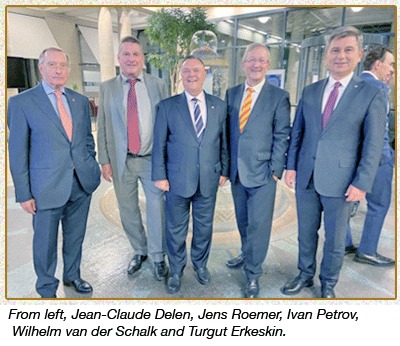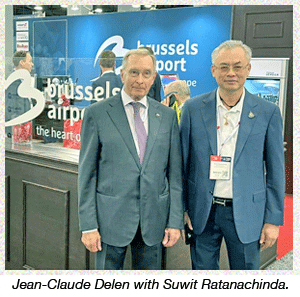 |
We know that Brussels is the city that will
host the next FIATA World Congress in October 2023.
After the complications the pandemic inflicted
on us all, it was refreshing to witness the wonderfully successful FIATA
Congress in Busan, South Korea in September this year, where the Brussels
event was confirmed. This will take place in eleven months and expectations
are on the rise. What came also true in the meantime is a series of other
events and initiatives that have taken place and will take place in the
European capital before the global gathering of FIATA delegates next October.
I had the opportunity to talk with our old friend Jean-Claude Delen, whom
FlyingTypers readers have already met in different occasions.
Jean-Claude has served as President in both CLECAT and FIATA and just
passed his baton to Chris Gillespie within the FIATA Foundation, besides
being a man of gravitas in various positions of the Belgian logistics
scene.
 Unsurprisingly
he was spotted with “Members of the FIATA Presidency, including
President Ivan Petrov and Senior Vice Presidents Mr. Turgut Erkeskin and
Mr. Jens Roemer, [who] attended the Logistics for Europe event in Brussels
which was aimed at enabling resilient and competitive supply chains. They
met and shared insights with industry representatives, including shippers,
logistics experts, European law makers, academics and lawyers amongst
others.” (source: FIATA) Unsurprisingly
he was spotted with “Members of the FIATA Presidency, including
President Ivan Petrov and Senior Vice Presidents Mr. Turgut Erkeskin and
Mr. Jens Roemer, [who] attended the Logistics for Europe event in Brussels
which was aimed at enabling resilient and competitive supply chains. They
met and shared insights with industry representatives, including shippers,
logistics experts, European law makers, academics and lawyers amongst
others.” (source: FIATA)
Brussels is the city where I lived for nearly
ten years to my complete satisfaction until the end of 2011. Never boring,
at times unexpectedly witty and humorous, it a wonderful place to dine,
dwell and thrive, so long as you are not thinking that a few drops of
rain are a scourge. In fact, even the local weather is much better than
the reputation it carries.
So what else is happening in Brussels that
matters to you? There are many other reasons to take a closer look at
what happens there, not only from a personal point of view. For example,
Belgium is about to embark in a nearly revolutionary experiment in work
relations: “all employees in Belgium, whether they work in the public
or the private sector, will have the choice of working nine and a half
hours a day over four days, or eight hours a day over five days. This
means they will essentially keep the same amount of working hours, but
will have the freedom to decide to power through longer working days for
just four days of the week. Prime Minister Alexander de Croo said he hoped
“the four-day workweek would make the notoriously rigid Belgian
labour market a little more flexible.” (source: Euronews)
I am not entirely sure how great an impact
this will have, in particular in logistics, where we are accustomed to
rather extended working hours for many days a week anyway even if you
would wish to have more free time, but this is surely an opportunity for
many areas of employment and my expectation is that it will be well received.
This being said, Belgians do not conceive their day as a mere container
for working hours. They know that there is more to life than that and
are willing to experiment. Belgians love a party: you can see that very
clearly during public holidays, when every woman or man who can walk,
flocks to the streets and enjoys beer, waffles and other delicacies that
the Belgian cuisine offers. Have you ever been queuing up for a cask of
frites in Brussel’s Place Jourdan? That is an experience. Belgians
have transformed the rather uninspiring potato crop into a desirable delicacy
and serve it in large quantities with mussels and beer, two other specialities
of theirs.
As Jean-Claude told me, gallons of beer
were in stock in Miami at TIACA’s Air Cargo Forum (https://www.aircargoforum.org/),
where he was spotted as representative of the Brussels Airport’s
interests. A visible booth serving Belgian beer was serving the many Belgians
present and the endless other nationalities gathered by TIACA in Florida.
At 77, JC, as many friends call him, still works as a consultant for Brussels
Airport and is senior advisor to the CEO. A man, whose day has 36 hours,
Jean-Claude still works incessantly and knows what he wants… for
example: cheaper internet connections in America, as he was “really
surprised of the cost of the internet in Miami; Europeans are not used
to it.”
Jean-Claude then told me that the organisation
of the event was good and the panels were interesting, but there had been
a couple of hicks in the exhibition, where some of the stands were not
completed on time. Etihad had to absorb some problems in the construction
of theirs and it was surprising that Messe Munich was perhaps not up to
their undisputable reputation this time.
 The
TIACA event was however commercially very good; Jean-Claude met Belgian
people there, whom had not met for years, even in Belgium. There was a
good atmosphere, he said; among others he also met our old friend and
Honorary Member of the Board of FIATA Suwit Ratanachinda (Honorary Chairman
of TIFFA, Bangkok, President of Thai Logistics Service Providers), who
was the host of the FIATA World Congress in Bangkok, when Jean Claude
and I started cooperating more closely at the time he was President in
2010. The
TIACA event was however commercially very good; Jean-Claude met Belgian
people there, whom had not met for years, even in Belgium. There was a
good atmosphere, he said; among others he also met our old friend and
Honorary Member of the Board of FIATA Suwit Ratanachinda (Honorary Chairman
of TIFFA, Bangkok, President of Thai Logistics Service Providers), who
was the host of the FIATA World Congress in Bangkok, when Jean Claude
and I started cooperating more closely at the time he was President in
2010.
The time devoted to the much-coveted TIACA
Awards was well managed by a radiant Glyn Hughes in full control. “This
gave me the chance to see Issa Baluch, too” said Jean-Claude, “and
to meet Olivier Bijaoui.” (more
on Olivier here) Issa Baluch is another FIATA Past President, who
has also been featured by the FlyingTypers on more than one occasion.
“Glyn, as usual, knew all the subjects
and was talking about files that he was very confident with. Kudos to
Glyn for managing the almost impossible task of surviving past the pandemic
for a group like TIACA, for which conferences and congresses were essential,”
was Jean-Claude’s remark. He also told me that the Belgian born
President of TIACA Steven Polmans was there, and he noted that he is “a
good friend” and that Polmans added: “if I were there ten
years earlier, we could have done more together.”
During the press conference Geert Aerts,
chief cargo and real estate officer in Brussels Airport, announced that
the next TIACA Executive Forum would be held in Brussels in 2023, making
Jean-Claude really happy. This is another reason why I am writing so much
about Brussels and Belgium, which literally seems to attract logistics
operators as a magnet next year.
There will be many more anecdotes to come
before the World Congress in Brussels next October, but Jean-Claude was
more on the watching side when we spoke about old friends in FIATA, as
he is no longer involved in the organisation other than in the Committee
of the Past Presidents and his Honorary position in the Extended Board.
Another person, whom our readers have met
more than once, was in Brussels on Nov 23rd: Jens Roemer, and he is featured
in the picture provided by FIATA with their Press Release. This gives
me the opportunity turn to another page.
As Chair of the FIATA WG Sea and Senior
Vice President, Jens has been cardinal in organising the “Building
Back Better Together” series of hybrid meetings FIATA has conceived
and masterminded in Geneva this year. In their own words: “The second
edition of the High-Level Maritime Dialogue titled ‘Build Back Better:
Shock-Resistant Supply Chains’ on November 7 was hosted by FIATA,
moderated by its Working Group Sea Chair and Senior Vice President, Mr
Jens Roemer. [Captured from their Press Release a few key points:] ‘Shipping
lines and forwarders will have to learn to cope with unexpected service
challenges as a new reality’ [according to the] Global Shippers
Forum. Supply chains have responded to a dramatic rise and fall in demand
in recent years. Lessons are to be learned to prepare for uncertainties
plaguing the future. Supply chain shifts were considered, as well as the
rise and fall in freight rates. Mr. John Butler, President and CEO of
the World Shipping Council (WSC) emphasised on behalf of the shipping
lines that ‘there is stiff competition in the shipping sector’,
and that ‘carriers followed demand and did not create it’.
In conclusion, Jens Roemer reminded participants that ‘the clock
cannot be turned back but stakeholders and regulators must learn from
mistakes of the past. No single stakeholder should be overconfident to
impose plans that are not complementary with the overall system.’
It was [also] agreed that decarbonising the supply chain is an urgent
priority for all stakeholders, [but] shippers remain concerned about the
cost of decarbonisation, which will ultimately be borne by them. Concluding
the dialogue, decarbonisation was put firmly on the agenda as a theme
for greater collaboration, whilst other areas of possible collaboration
noted included sustainability, digitalisation and safety and security.”
Whilst I am grateful to FIATA for the work
they are doing on behalf of our sector, my personal impression is that
climate change issues remain imperative for everybody, and for logistics
in particular, but… The pandemic first and tensions in the energy
market caused by the invasion of the Ukraine, as well as the politics
involved in who pays what that we have recently witnessed at the COP27
in Egypt have nearly put this issue on the backburner. It should have
a much more watchful approach on the tables of the policymakers, but
. . . The issues brought to the fore by the conflict in the Ukraine,
which further contributed to complicate an already fuzzy picture are shifting
people’s attention away from the climate threat, which unfortunately
cannot be eluded. The next eleven months will be crucial to see what policymakers
can do to steer us into a safer environment. By the time we gather in
Brussels again in October 2023 perhaps we shall understand where our boat
is taking us then.
Maybe we shall also have a clearer picture
of the markets that are now anything but predictable. We shall probably
have recognised the content that dutifully UNCTAD prepares every year
about the market trends in the maritime sector, which accounts to some
80% of international trade. Freight markets have recently seen the biggest
rollercoaster ride in recent decades. Will we learn lessons from this?
I am afraid I must leave this question unanswered. Let us see what UNCTAD
tells us in their own words.
“The UN Conference on Trade and Development
(UNCTAD) in its flagship "Review of Maritime Transport 2022"
has called for increased investment in maritime supply chains. Ports,
shipping fleets and hinterland connections need to be better prepared
for future global crises, climate change and the transition to low-carbon
energy. The supply chain crisis of the last two years has shown that a
mismatch between demand and supply of maritime logistics capacity leads
to surges in freight rates, congestion, and critical interruptions to
global value chains. Ships carry over 80% of the goods traded globally,
with the percentage even higher for most developing countries, hence the
urgent need to boost resilience to shocks that disrupt supply chains,
fuel inflation and affect the poorest the most. “We need to learn
from the current supply chain crisis and prepare better for future challenges
and transitions. This includes enhancing intermodal infrastructure, fleet
renewal and improving port performance and trade facilitation," UNCTAD
Secretary-General Rebeca Grynspan said. "And we must not delay the
decarbonization of shipping," she added. "If there is one thing
we have learned from the crisis of the last two years it is that ports
and shipping greatly matter for a well-functioning global economy,"
said Shamika N. Sirimanne, director of UNCTAD’s technology and logistics
division. "Higher freight rates have led to surging consumer prices,
especially for the most vulnerable. Interrupted supply chains led to lay-offs
and food insecurity." Measures to protect competition needed in the
face of market consolidation: The report says the container shipping sector
has been transformed by horizontal consolidation through mergers and acquisitions.
Shipping carriers have also pursued vertical integration by investing
in terminal operations and other logistics services. Between 1996 and
2022, the top 20 carriers increased their share of container-carrying
capacity from 48% to 91%. And over the past five years, the four largest
carriers increased their market shares to control more than half of the
global capacity. (source UNCTAD)
Brussels, Washington, Beijing, Delhi, Tokyo
or Rome, it is no longer true that all roads lead to Rome, but it is surely
true that all emissions lead to destruction and there is no way we may
ignore this. Let me conclude this long and meandering article with an
appeal to listen to Greenspan’s exhortation and to take stock of
the ups and downs we have experienced in the freight markets.
You do not need a telescope to see the light
that comes from these observations made in plain common sense. Let me
also tell you that these are nearly the same conclusions that FIATA has
been publishing in repeated occasions under the guidance of its WG Sea
and that the US FMC have actually translated into legal actions. Maybe
learning a few lessons here and there is not such a bad idea even for
the liners, who are now struggling with plummeting rates after a season
of almost uncanny increase. This soothing lesson-learning may play a role
in favour of the next generation, which seems to be trapped in a world
of extremes and certainly does not benefit from much peace of mind concerning
their future. I am trying to think which of these issues will be presented
by TIACA and FIATA next year in Brussels in their respective gatherings,
but one point is sure: they will be on everybody’s agenda.
As my great friend and former FIATA Secretary
General Heiner Rogge once said: “let us not try to misunderstand
everything.” This is not a good time to misunderstand the signals
that our planet is sending us, which is, on the positive side, the following:
first be reasonable, and then thrive!
Marco L. Sorgetti
|




